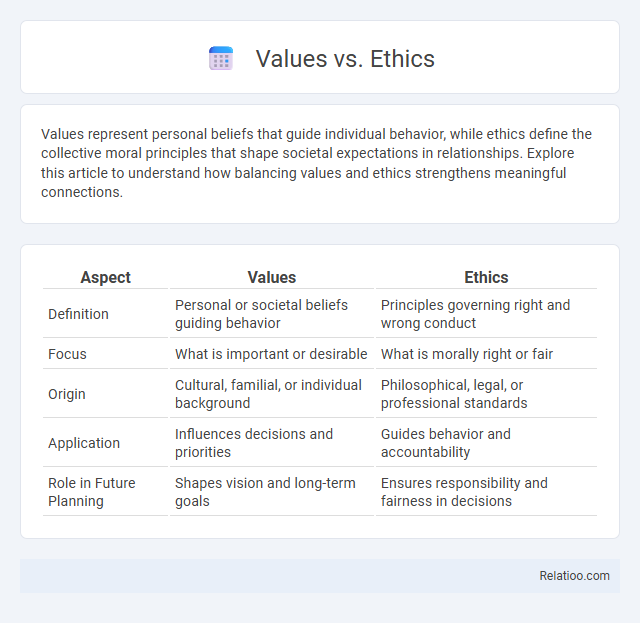Values represent personal beliefs that guide individual behavior, while ethics define the collective moral principles that shape societal expectations in relationships. Explore this article to understand how balancing values and ethics strengthens meaningful connections.
Table of Comparison
| Aspect | Values | Ethics |
|---|---|---|
| Definition | Personal or societal beliefs guiding behavior | Principles governing right and wrong conduct |
| Focus | What is important or desirable | What is morally right or fair |
| Origin | Cultural, familial, or individual background | Philosophical, legal, or professional standards |
| Application | Influences decisions and priorities | Guides behavior and accountability |
| Role in Future Planning | Shapes vision and long-term goals | Ensures responsibility and fairness in decisions |
Understanding Values and Ethics
Values represent your deeply held beliefs that guide decision-making, while ethics encompass the moral principles governing behavior in professional and personal contexts. Understanding values involves recognizing what is fundamentally important to you, shaping your motivations and choices. Ethics ensure that your actions align with societal norms and professional standards, promoting consistency between your values and behavior.
Core Differences Between Values and Ethics
Values represent your personal beliefs and principles that guide behavior, while ethics refer to formalized rules or standards governing conduct within a group or society. Core differences between values and ethics lie in their origin: values are internally driven and subjective, whereas ethics are externally imposed and objective. Understanding this distinction helps you navigate moral decisions by aligning your personal values with societal ethical frameworks.
The Origin of Values
Values originate from cultural traditions, social norms, and individual experiences that shape what is considered important or desirable within a society. Ethics develop as systematic principles derived from these values, guiding behavior and decision-making to maintain social order and fairness. Value alignment occurs when personal or organizational actions consistently reflect these deep-seated values and ethical standards, fostering trust and coherence.
How Ethics Are Formed
Ethics are formed through a combination of cultural norms, societal rules, and personal experiences that shape an individual's sense of right and wrong. Values represent deeply held beliefs that influence behavior, while value alignment occurs when your principles consistently match the ethical standards of your organization or community. Understanding how ethics develop helps you navigate complex moral decisions and foster integrity in both personal and professional settings.
Personal Values vs Professional Ethics
Personal values represent your core beliefs and guiding principles that influence your behavior and decisions in everyday life, while professional ethics consist of the formal standards and rules designed to govern conduct in the workplace. Value alignment occurs when your personal values harmonize with the professional ethics of your organization, ensuring consistency and integrity in your actions. Understanding the distinction and overlap between these concepts helps you navigate ethical dilemmas and maintain authenticity in both personal and professional environments.
The Role of Culture in Shaping Values and Ethics
Culture plays a crucial role in shaping values and ethics by influencing the norms, beliefs, and behaviors considered acceptable within a society. Your understanding of values and ethics is deeply rooted in cultural background, which affects decision-making and moral judgments in both personal and professional contexts. Value alignment ensures that your actions and principles are consistent with the cultural expectations and ethical standards of the environment you operate in.
Importance of Aligning Values and Ethics
Aligning values and ethics ensures your actions consistently reflect both personal beliefs and societal moral standards, fostering trust and integrity in relationships. Misalignment can lead to conflicts, reduced morale, and ethical dilemmas that undermine organizational culture or personal reputation. Prioritizing this alignment promotes clarity, accountability, and sustainable decision-making in all areas of life.
Common Conflicts Between Values and Ethics
Conflicts between values and ethics often arise when personal beliefs clash with professional standards or societal norms. Your deeply held values may sometimes contradict organizational ethics, leading to dilemmas in decision-making and behavior. Understanding and navigating these conflicts require clear communication and compromise to achieve value alignment that respects both personal integrity and ethical obligations.
Real-life Examples of Values and Ethics in Action
Values represent your core beliefs, such as honesty or respect, guiding personal behavior and decisions, while ethics refer to the moral principles and standards set by a group or society, like professional codes of conduct. Value alignment occurs when your personal values correspond with the ethics of your workplace or community, fostering trust and integrity in real-life situations. For example, a nurse who values compassion and adheres to medical ethics ensures patient care is both empathetic and professionally responsible.
Building an Ethical and Value-Driven Life
Values represent your core beliefs and principles guiding personal behavior, while ethics define the moral standards and rules governing conduct within society or specific professions. Value alignment ensures your actions and decisions consistently reflect your deeply held values, fostering integrity and authenticity. Building an ethical and value-driven life requires continuous self-reflection and commitment to harmonizing your values with ethical practices, enhancing trust and fulfillment in your personal and professional relationships.

Infographic: Values vs Ethics
 relatioo.com
relatioo.com